School Highlights
Lenoir Community College serves 3,069 students (25% of students are full-time).
The college's student:teacher ratio of 9:1 is lower than the state community college average of 13:1.
Minority enrollment is 47% of the student body (majority Black), which is less than the state average of 48%.
Quick Stats (2025)
- Enrollment: 3,069 students
- In-state tuition: $2,279
- Out-state tuition: $8,039
- Student:teacher ratio: 9:1
- Minority enrollment: 47%
- Source: Verified school update
School Overview
The teacher population of 333 teachers has stayed relatively flat over five years.
Lenoir Community College
(NC) Community College Avg.
Carnegie Classification
Associate's Colleges: Mixed Transfer/Career & Technical-High Nontraditional
Associate's Colleges: Mixed Transfer/Career & Technical-High Nontraditional
Institution Level
At least 2 but less than 4 years
At least 2 but less than 4 years
Institution Control
Public
Public
Total Faculty
333 staff
256 staff
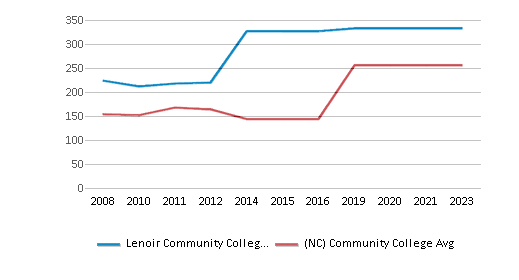
School Calendar
Student Body
The student population of Lenoir Community College has grown by 21% over five years.
The student:teacher ratio of 9:1 has increased from 7:1 over five years.
The Lenoir Community College diversity score of 0.61 is less than the state average of 0.66. The school's diversity has stayed relatively flat over five years.
Total Enrollment
3,069 students
2,542 students
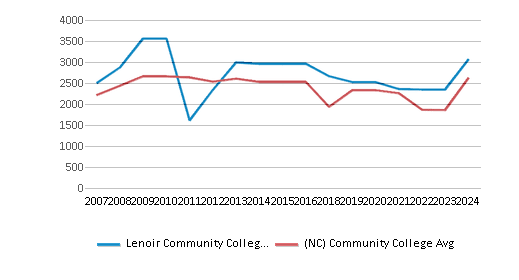
Student : Teacher Ratio
9:1
13:1
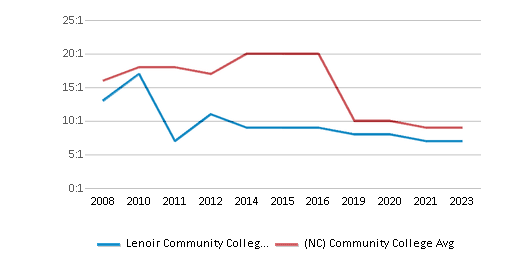
# Full-Time Students
782 students
766 students
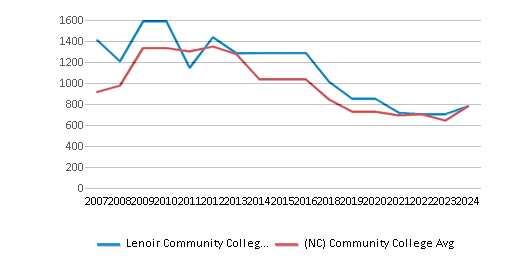
# Part-Time Students
2,287 students
1,813 students
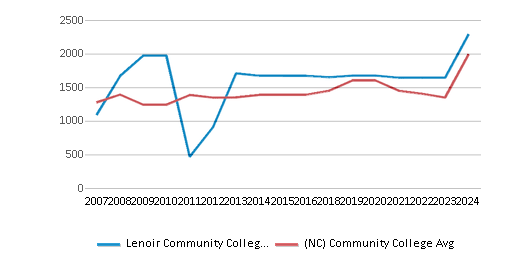
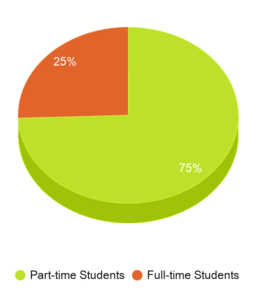
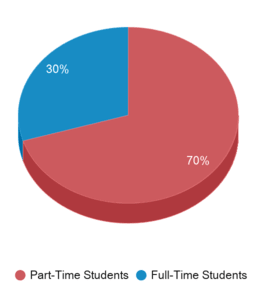
# Enrollment Undergraduate
306 students
316 students
# Full-Time Undergraduate Students
782 students
766 students
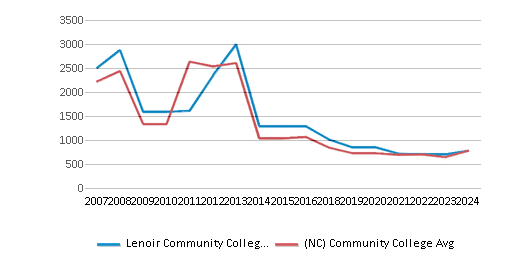
# Full-Time Graduate Students
n/a
22 students
# Part-Time Undergraduate Students
2,287 students
1,990 students
# Part-Time Graduate Students
n/a
3 students
Total Dormitory Capacity
n/a
717 students
% American Indian/Alaskan
n/a
1%
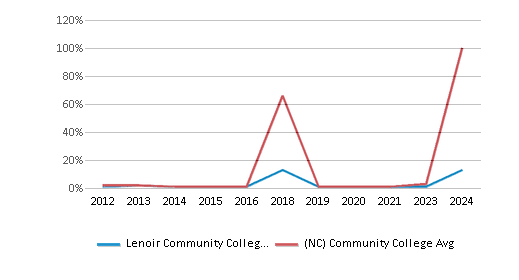
% Asian
1%
3%
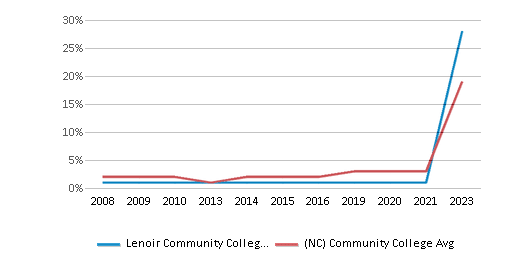
% Hispanic
13%
13%
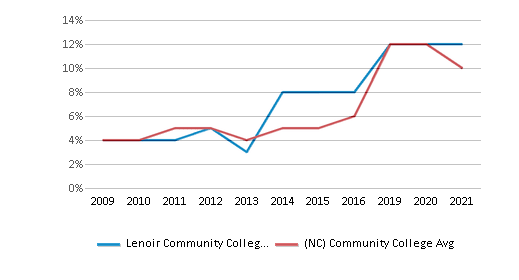
% Black
30%
21%
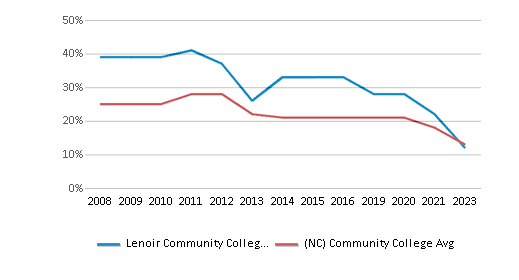
% White
53%
52%
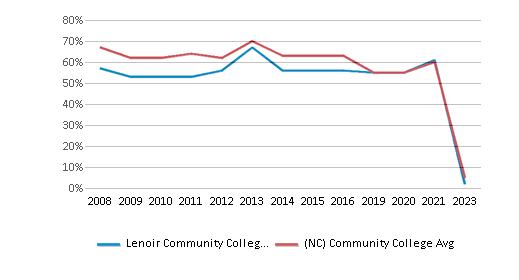
% Hawaiian
n/a
1%
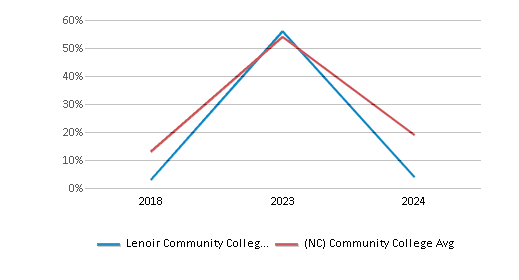
% Two or more races
2%
3%
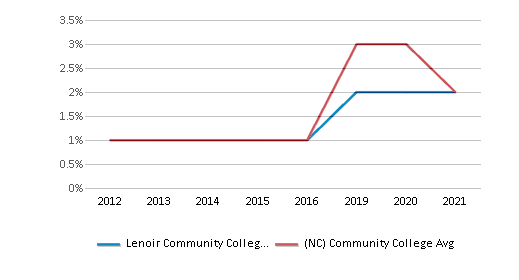
% Non Resident races
n/a
1%
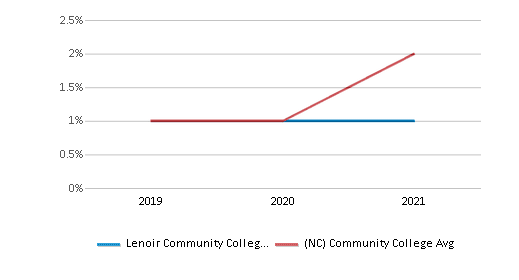
% Unknown races
n/a
5%
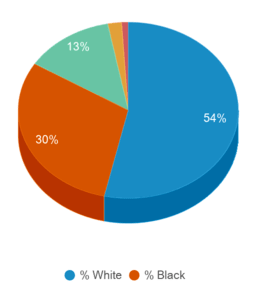
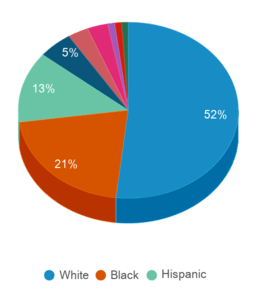
Diversity Score
0.61
0.66
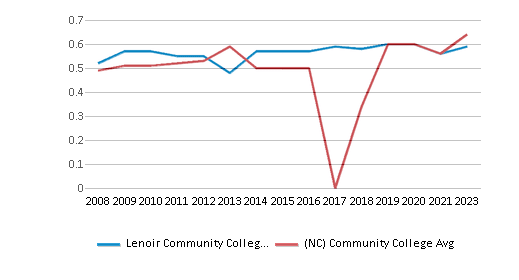
College Completion Rate (Students who graduate in less than 4 years)
0.2899%
0.3684%
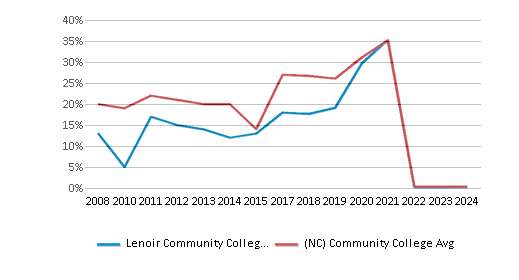
College Completion Rate (Students who graduate in 4 years or more than 4 years)
n/a
0.4286%
Average Graduate Earnings (10 Years)
$27,500
$27,500
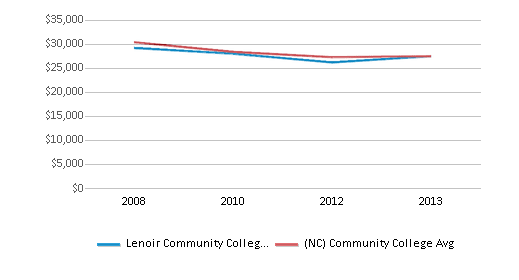
Tuition and Acceptance Rate
The public in-state tuition of $2,279 is less than the state average of $3,915. The in-state tuition has declined by 11% over four years.
The public out-state tuition of $8,039 is less than the state average of $9,508. The out-state tuition has declined by 7% over four years.
In-State Tuition Fees
$2,279
$3,915
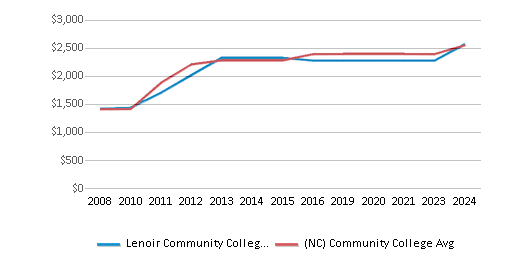
Out-State Tuition Fees
$8,039
$9,508
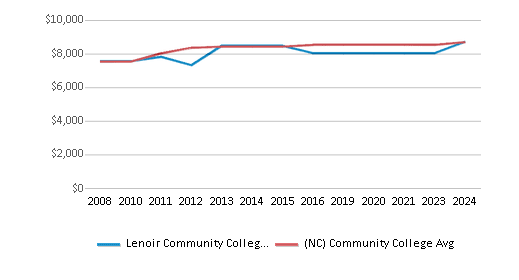
% Students Receiving Some Financial Aid
82%
82%
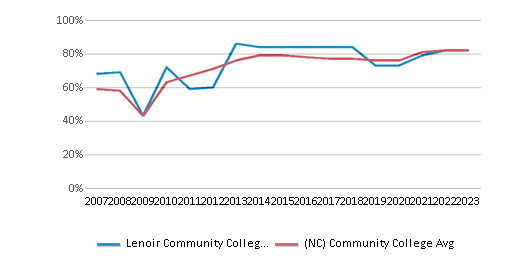
Median Debt for Graduates (Year 2007)
$2,625
$6,000
Median Debt for Dropouts
$2,625
$3,668
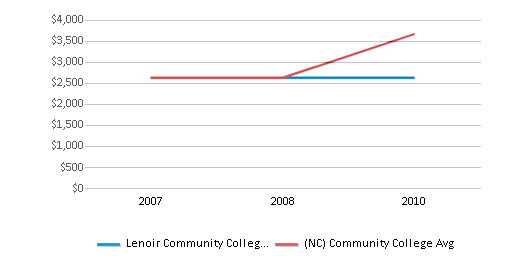
Acceptance Rate
n/a
82%
SAT Reading
n/a
488
SAT Math
n/a
498
ACT Composite
n/a
20
ACT English
n/a
13
ACT Math
n/a
16
Sports
Total Sports Offered
3 sports
Sports
Baseball, Basketball, Volleyball
Extracurriculars
Total ExtracurricularsTotal Extra-curric.
19 extracurriculars
ExtracurricularsExtra-curric.
Club or Organization:
Automotive Customizing Club, Biomechanics Club, Computering Engineering Club, Cooks and Connoisserus, Criminal Justice Club, Graphic Arts & Imaging Technology Club, Horticulture Club, Human Service Club, Lamplighters Club, Medical Assisting Club, Night Owls Club, Nightingales Club, Phi Beta Lambda, Phi Theta Kappa, Radiant Beams Club, Science Club, Student Government Association, Surgical Technology Club, Welding Club
Automotive Customizing Club, Biomechanics Club, Computering Engineering Club, Cooks and Connoisserus, Criminal Justice Club, Graphic Arts & Imaging Technology Club, Horticulture Club, Human Service Club, Lamplighters Club, Medical Assisting Club, Night Owls Club, Nightingales Club, Phi Beta Lambda, Phi Theta Kappa, Radiant Beams Club, Science Club, Student Government Association, Surgical Technology Club, Welding Club
Source: 2024 (or latest year available) Integrated Postsecondary Education Data System (IPEDS) , School Administrators
School Notes
- Lenoir Community College (LCC) chartered April 3, 1958, is part of the North Carolina Community College System. Primarily serving Lenoir, Greene, and Jones counties, LCC is located in Kinston, North Carolina, at the intersection of US 70 and NC 58. The College offers both degree and non-degree programs and serves approximately 4,300 curriculum students and 14,000 continuing education students annually ranking 15th in enrollment among the 58 community colleges in the state. Lenoir Community College provides excellent educational opportunities delivered by well-qualified, professional faculty using state-of-the-art equipment through traditional and distance learning options. LCC’s student-oriented support staff is committed to providing high quality support services to assist students in achieving their educational goals. The College offers 45 associate degree programs, 33 diploma programs, and 86 certificate/skills certificate programs. Lenoir Community College is accredited by the Southern Association of Colleges and Schools Commissions on Colleges.
Frequently Asked Questions
How much does Lenoir Community College cost?
Lenoir Community College's tuition is approximately $2,279 for In-State students and $8,039 for Out-State students.
What sports does Lenoir Community College offer?
Lenoir Community College offers 3 interscholastic sports: Baseball, Basketball and Volleyball.
Recent Articles

Obtaining Your Bachelor's Degree at a Community College
Explore the evolving landscape of community colleges offering bachelor's degrees, addressing affordability, accessibility, and workforce needs.

A to Z of Community College Certificates and Courses
From business and healthcare to technology and skilled trades, the article showcases the breadth of options available to students seeking to enhance their knowledge, develop new skills, or pursue career advancement.

What is a Community College?
This comprehensive guide explains what a community college is, its history, and its role in higher education. It covers the types of programs offered, differences from four-year colleges, benefits of attending, and important considerations for prospective students, providing valuable insights for those exploring educational options.









